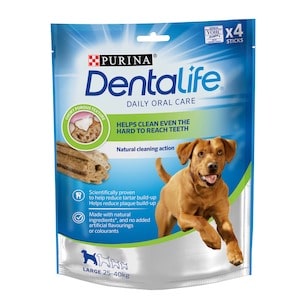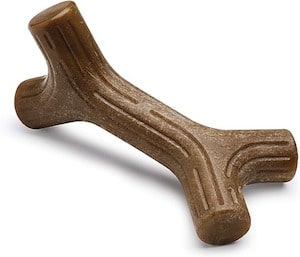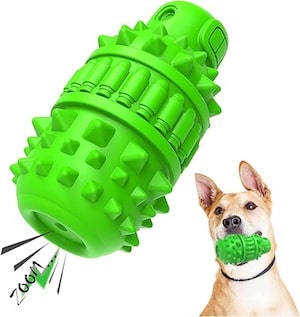Dogs are wonderful companions, but they can also be destructive chewers. One of the common targets of their chewing is the skirting board, which is the wooden trim that runs along the bottom of the wall. In this article, we will explore why dogs chew skirting boards and how to stop Dog Chewing Skirting Board? We will also give you some tips on how to repair skirting boards damaged by dogs.
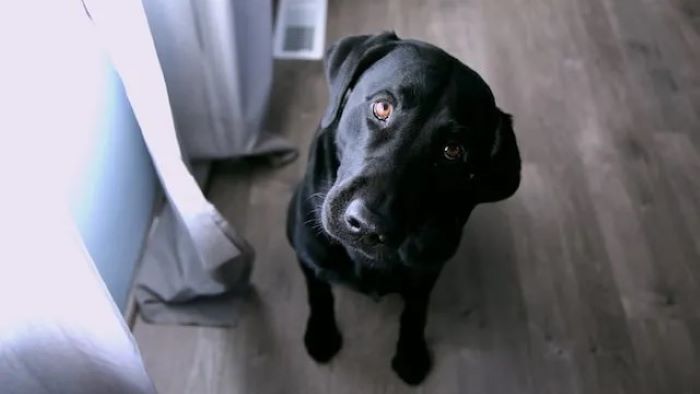
Key Takeaways
- Dogs chew skirting boards for various reasons, such as teething, dental problems, boredom, anxiety, frustration, imitation, curiosity, or medical conditions.
- To stop dogs from chewing skirting boards, owners can provide toys, exercise, training, crating, monitoring, cleaning, spraying, or consulting a vet.
- To repair skirting boards damaged by dogs, owners can use filler, putty, caulk, or replace the section.
You Might Also Like:
Why Do Dogs Eat Skirting Boards?
Skirting boards constitute wood content and dogs can’t resist the temptation of chewing them. In addition, here are some of the prominent reasons why your dog is chewing on skirting boards.

#1 Teething and dental issues
If you have a puppy, It’s possible that it is chewing on the skirting board to relieve any pain or discomfort that comes with teething. At 4 to 30 weeks, puppies’ teeth start to grow quickly and the process can be quite painful for the young ones. This is a significant reason you spotted some unsightly teeth marks on the skirting board.
In adult dogs, dental problems may trigger continuous chewing. The dog shifts their focus towards chewing to cope with pain.
#2 Getting bored
Often you may observe that your canine friend is getting bored. This situation is normal, it becomes more frequent if you don’t spend more time with them. Thus, in your absence, they start looking for other activities and chewing the skirting board happens to be one of them.
Hence, if your canine friend is showing signs of compulsive chewing, along with obsessive licking, this suggests that they’re in need of more physical exercise & mental stimulation.
#3 Anxiety or Frustration
In general, dogs can get anxious for many reasons. There are plenty of symptoms which suggest that the dog is suffering from anxiety. One of the symptoms also includes obsessive wood chewing. So, you must figure out what’s triggering the action to know what makes your dog chew the skirting board more often.
However, it’s crucial to note that general anxiety cannot cause such destructive chewing behaviour. Separation anxiety is the most likely scenario, and because the dog feels disconnected from the owners, they tend to respond by doing intense activities. In addition, it’s quite possible that your dog is upset and frustrated. As an act of frustration, they can easily make them chew the skirting board.
#4 Reacting to owner’s behaviour
This may come to you as a surprise, but, it’s possible that you may have encouraged this behaviour. For instance, if you regularly punish your dog for small mistakes, scold them or yell at them for chewing on wood, they may consider this as a way to get your attention.
It’s necessary to control your actions near your furry friend to avoid backing such behaviour. So, to do so, you can isolate your dog from the area and change their habit instead of showing them you are upset, which they may see as you being excited and engaged.
#5 Reflecting on other dogs’ actions
Dogs tend to pick up habits from their pack. If you visited someone and your dog saw the other dog chewing on the skirting board or any similar wooden material, then they will replicate this behaviour at home as well.
Also, if you have more dogs in one home, it’s important to monitor their behaviour properly as they will pick up actions from each other and act on them.
#6 The skirting board has something
At times, your furry friend is chewing on the skirting boards because they smell or see something that is interesting to them. The board may have dirt, insects, food crumbs, or dust on them. So, it’s better to clean off the place.
#7 The dog is suffering from a medical condition
There are a few medical conditions which can cause dogs to chew on wood and objects like skirting boards. Hence, if your dog is reflecting such behaviour, consult your vet to get proper insights. They might need some treatment for their medical condition that triggers such unusual and compulsive behaviour.
How To Stop Dogs From Chewing Skirting Boards
Generally, it’s best if you consult with the vet before taking any action. Still, here are some of the ways you can prevent your dog from chewing on skirting boards.
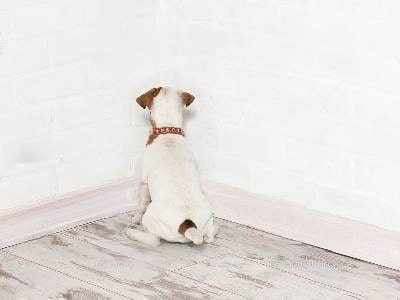
- Keep them engaged with toys
This is the simplest way to divert your furry friend’s attention. Offer them a bunch of toys to play with, this will use up all their energy and they won’t have enough left to chew on a skirting board or any wood material. Provide your dog with the best dog chews like durable nylon bones, rubber toys, or treats specifically designed for chewing.”
You can go to another room for some time. This will let you know how they might behave in your absence. So, if your dog keeps playing in your absence, you can use this trick whenever you plan on going out without them.
- Fun Activities
Fun activities such as walking, running, swimming, and playing fetch can massively help to burn off energy. In fact, you can also benefit from these activities if you tag along with your canine friend. If you outline a routine for your dog, you’ll see a change in its behaviour.
- Assign a specific place
You can assign a particular place in your house where there is less wood material or one where you can easily cover the skirting boards. You can keep their toys in that area. Doing this will help your dog know that at this specific place, they can chew on stuff and toys.
- Crate the dog
If your dog often chews in your absence, you can crate them while you are gone. Use the space you have assigned and put the crate there. They will chew the toys you put in the crate instead of chewing the skirting board.
- Supervise using Camera
If you wish to know exactly what makes your dog chew skirting boards, you can install a camera. This camera will let you know what lures your dog towards those skirting boards. For instance, if there is a specific trigger like a doorbell ring or any random sound in your absence can make them anxious and chew on the skirting board.
- Train the dog
Training the dog is probably the best way to stop your dog from chewing the skirting board. You can instruct them to chew on toys instead of the skirting board. Initiate the training by using basic commands such as come, sit, and stay.
Afterwards, define a command like “leave it”, and if they obey, offer them a small treat or some reward for their obedience.
- Regular cleaning of the skirting board
Dog chewing skirting board is probably lured by dust, dirt or any other substance. So, if you wish to stop dog chewing skirting boards, clean up the surface regularly. Make sure you use a non-toxic cleaner and keep the surface dry.
- Use bitter spray
Applying a bitter fragrance spray can help deter your dog from chewing on skirting boards. These sprays usually contain fragrances of bitter substances like vinegar or lemon juice.
Now, even after using these methods if your dog continues chewing the skirting board you can consult a vet or take assistance from dog training organisations like APDT.
Deer antlers are a popular chewing option for dogs, but be sure to sterilize them properly first. Check our guide on, “how to sterlize deer antlers for dog chews” for more details.
How to stop puppy chewing skirting boards while teething?
We saw the methods you can use to stop your dog from chewing the skirting board. But, if you have a young pup who is teething, it will chew anything within its sight. This behaviour is common but, if the pup is chewing the skirting board here are some ways you can stop them:
- Offer plenty of toys to play with
- Monitor them frequently
- Spend more time and be attentive, this will ensure they don’t act out
- Train the pup for obeying commands such as sit, come, stay etc.
- Get help from a professional trainer
Dog chewed skirting boards repair
Once your dog chews down a skirting board, the repairs can get costly. However, you can use some simple methods to repair the damage.
- Use wood filler
This is a substance that is useful to fill in holes and cracks in the wood. It comes in a variety of colours, so you can select one that closely compares the colour of your skirting boards. Once the filler gets dry, you can sand it down so that it’s level with the rest of the board.
- Putty or caulk
Another alternative is to use putty or caulk. This is a little more difficult approach, but it is effective. Here, you’ll need to completely clean out the damaged area.
Afterwards, apply the putty or caulk and rub it over with a wet finger. Once it’s dry, you can sand it down until it’s flush with the remaining part of the board.
- Replacing the damaged section
Now, at times the damage is extensive, you may need to replace the entire section of the skirting board. This may sound difficult but it isn’t. You can simply measure and cut a fresh piece of wood to size, then nail it into place. Again, sanding will be crucial to get a smooth finish.
If any of these methods don’t work out you can call a professional worker to get the repairs done on the dog-chewing skirting board.
FAQs
Why is my dog chewing on wood?
Your dog is chewing on wood to cope with stress, anxiety or loneliness. Chewing releases endorphins which help ease up the stress and mentally nurture your dog. They develop this habit while being alone in the house for a longer period.
Why is my dog chewing the skirting board?
Seeing the teeth marks of your furry friend on skirting boards, door frames, table legs or any other wooden furniture, can get very aggravating. In the majority of cases, it’s usually just boredom, but it also indicates a sign of separation anxiety. The dog notices chewing on these things as a way to escape from such anxiety or other stressful situation.
What is a homemade chew deterrent for dogs?
A homemade chew deterrent for dogs is an anti-chew spray for dogs and is very simple and clear. You’ll require white vinegar, apple cider vinegar, and a spray bottle. Simply mix one part white vinegar and 2 parts apple cider vinegar in the spray bottle, shake well, and spray it onto skirting board and other surfaces your dog keeps chewing on.
Why Does My Dog Chew Doorframes?
Apart from the skirting boards, many dogs also constantly chew on doorframes. The common reasons include boredom, stress, separation anxiety, imitating fellow canines and so on. In some cases, a dog may chew a doorframe if you have shut it out of a room that it wants to enter in or just to grab your attention.
Final Words On How to Stop Dog Chewing Skirting Board?
To stop a dog from chewing the skirting boards, you’ll require patience. Scolding or punishing your dog for chewing on the skirting board will only make the situation worse. This behaviour is not going to last permanently, but, it’s very important to approach this situation properly.
If the situation gets worse, consult a behaviourist, the Vet or a professional dog trainer to know why your dog has developed the habit of chewing the skirting board.
Looking for a sturdy, long-lasting chew toy? Consider getting a paddywack for your dog. Paddywacks are natural beef hide chews made specifically for heavy chewing, Want to know more about paddywacks, check out our guide on what is paddywack?
